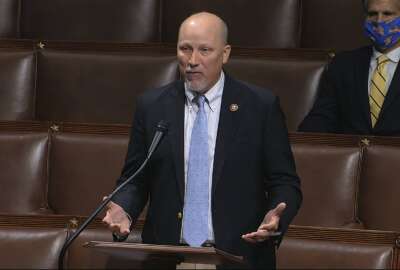
The Public Service Reform Act would wreck the civil service
A new bill introduced in the House of Representatives, titled the Public Service Reform Act, is not about public service and is certainly not reform. Rather than...
A new bill introduced in the House of Representatives, titled the Public Service Reform Act, is not about public service and is certainly not reform. Rather than addressing accountability or hiring and pay challenges, the bill would make all federal workers at-will employees. The result would be a civil service that is little more than two million political appointees.
Here is the key text of the bill:
IN GENERAL.—Notwithstanding any other provision of law, rule, or regulation, and except as provided in paragraph (2), any employee in the executive branch of Government shall be considered at will, and—
(A) may be subject to any adverse personnel action (up to and including removal) for good cause, bad cause, or no cause at all; and(B) may not challenge or otherwise appeal such an action except as provided in subsection (b).LIMITATION.
(A) IN GENERAL.—An employee may not be subject to any adverse personnel action under this Act for any reason prohibited section 2302(b) of title 5, United States Code.
(B) PROCEDURES.—The President shall establish procedures to enforce compliance with paragraph (1), including providing for disciplinary measures against any employee who violates such paragraph. Nothing in this subparagraph shall be construed to grant an employee the right to review or appeal an adverse personnel action outside such procedures.Note the key words here – “at-will” and “may be subject to any adverse personnel action (up to and including removal) for good cause, bad cause, or no cause at all.” If we want to have a civil service that is staffed based on merit, why would any reasonable person want to write into law provisions that say a federal worker can be fired for good cause, bad cause, or no cause at all? Bad cause and no cause at all have no place in a civil service that is based on merit. Indeed, that kind of language would have catastrophic results for the civil service and the American people they serve.
Imagine the civil service after passage of this bill. A supervisor tells his direct report to doctor the numbers in an employment report. The employee, recognizing that factual data is essential to effective government, says no. S/he is fired and replaced with someone who will do as they are told. A political appointee decides an office should be shut down and relocated to somewhere more friendly to his/her cause. No problem, just fire all of the staff in the office. No need to run a RIF, because “Notwithstanding any other provision of law, rule, or regulation” means those rules are irrelevant. In fact, courts have consistently ruled that such language means exactly what it says. Don’t bother pointing to some law that offers protection, because the plain language of the bill says “Notwithstanding any other provision of law, rule, or regulation.” Rather than a government of qualified people, we would end up with a government of partisans and sycophants whose word cannot be trusted and who will no longer have any job security when they choose to do the right thing. Rather than a civil service where the rule of law is enforceable by the courts, we would have a civil service that relies on politicians always doing the right thing.
Supporters of the bill argue that the provisions that say “An employee may not be subject to any adverse personnel action under this Act for any reason prohibited section 2302(b) of title 5, United States Code” would protect employees from prohibited personnel practices. I do not believe that is much protection. First, the bulk of the prohibited personnel practices do not address actions that basically boil down to “I don’t like you.” They are related to veteran preference, racial and other discrimination, and whistleblowing. Second, the only route to appeal a downgrade or removal would be the process the President and an agency creates. It clearly sates “Nothing in this subparagraph shall be construed to grant an employee the right to review or appeal an adverse personnel action outside such procedures.” It goes on to lay out procedures for taking actions, keeping decisions entirely within the agency taking the action. Employees would have no right to a hearing, no right to discovery, and no right to a third party review. Bargaining unit employees would not have a right to grievance and arbitration procedures. Employees with performance problems would not be covered by the adverse action procedures in 5 USC Chapter 43. Because employees would be subject to the whims of their agencies, the Merit Systems Protection Board (MSPB) would no longer be necessary and would be abolished. Let’s just forget the fact that agencies win their cases before the MSPB 85 to 90 percent of the time. Apparently batting .900 isn’t good enough for the sponsors and proponents of this bill.
The bill does appear to provide access to EEOC for complaints regarding prohibited personnel practices, but says “an individual who is an employee or applicant to be an employee and who alleges that the individual was subject to an adverse personnel action that is a prohibited personnel action described in section 2302(b)(1) of title 5, United States Code, shall seek relief for such action from the Equal Employment Opportunity Commission as if such individual was an employee of an employer (as that term is defined in section 701 of such Act).” Section 701 of the Civil Rights Act excludes the United States government from the definition of an employer. The way this bill is constructed, it appears there may really be no recourse outside the agency,
Proponents of this bill argue that the Merit System Principles and Prohibited Personnel Practices are all the protection employees really need. I simply do not believe that is true. After working in and around the federal government for more than 40 years, I have seen examples of managers who took actions against employees they simply did not like. I have seen officials who were supposed to make unbiased decisions on disciplinary and adverse actions proposed by their subordinates have improper conversations with those subordinates before they rendered a decision. I have seen political appointees from both parties deciding in their first week on the job that career employees cannot be trusted, only to see them change their minds once they work with them for a while. If this bill became law, those appointees would likely fire the employees before they had a chance to prove themselves.
If you think the courts would sort this mess out, think again. First of all, the bill says there is no recourse to third parties outside of procedures in the agency and defined by the president. Courts may find they have no ability to review anything, On top of that, the plain language of the bill says federal workers are at-will employees who can be fired for good cause, bad cause, or no cause at all, and that the bill’s provisions are effective notwithstanding any other law, rule or regulation. If some provisions of this law do end up in court, the courts are likely to look at that plain and unambiguous language to determine that federal workers are exactly what the bill says — at-will employees.
The Pendleton Act created the modern civil service in 1883. Prior to its passage, we had a spoils system that meant large swaths of the federal government turned over at every change of administration. Some proponents of this bill and of Schedule F would have you believe that job protections for the civil service did not exist prior to President Kennedy’s 1962 Executive Order 10987, which directed agencies to establish internal appeals processes. What about President McKinley’s Executive Order 101, signed in 1897, that said “No removal shall be made from any position subject to competitive examination except for just cause and upon written charges filed with the head of the Department, or other appointing officer, and of which the accused shall have full notice and an opportunity to make defense.” Or the Lloyd-LaFollette Act of 1912, that codified the protections found in EO 101, saying employees in the classified civil service could not be removed “except for such cause as will promote the efficiency of said service and for reasons given in writing, and the person whose removal is sought shall have notice of the same and of any charges preferred against him.” It also provided protections to whistleblowers.
If you think the proposal for Schedule F is bad, wait until this monstrosity is enacted. There is virtually nothing good that can come out of this bill. It might make it possible to fire the small number of poor performers who are not dealt with, but it would do it at the expense of a merit-based civil service. It would have such a chilling effect that civil servants would be hesitant to speak the truth to their bosses.
Given the rabid partisanship that has engulfed this country, do we really think the partisans who are appointed will not clean house every time the White House changes hands? Do we really think a government of political hacks and sycophants is in the best interests of the American people? Do we think that making government more partisan will make it more trusted by the people?
Jeff Neal authors the blog ChiefHRO.com and was previously the chief human capital officer at the Department of Homeland Security and the chief human resources officer at the Defense Logistics Agency.
Copyright © 2024 Federal News Network. All rights reserved. This website is not intended for users located within the European Economic Area.





